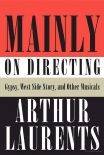Mainly on Directing Arthur Laurents (best ereader for epub .TXT) 📖

- Author: Arthur Laurents
Book online «Mainly on Directing Arthur Laurents (best ereader for epub .TXT) 📖». Author Arthur Laurents
The No Walls concept is not wrong per se for musicals. Anyone Can Whistle, Floyd Collins, and Spring Awakening, to name three exceptions, would suffocate within walls. Each is without walls not because of a whim or a concept; the work itself calls for a fluid stage. And that's the point—a point as important for a director as having the musical in his bones, if not more so: everything stems from the basic material.
Spring Awakening, first staged Off-Broadway, was an exception in another way: it exploded with the first original musical staging in years—the extraordinary work of Bill T. Jones. Like Balanchine and Robbins, who were brilliant both in ballet and on Broadway, Jones is a choreographer with his own dance company but his bones jump with theatre musicality. Although he was not the director, his musical staging enhanced the play immeasurably. Typical was his use of the microphone that has become deliberately visible in today's musicals because of the hip-hopalong desire to attract a young audience with elements familiar from rock concerts. The “spring awakening” is the awakening of sexuality in teenagers. The shape and size of the mics used by Jones, the way the boys pulled them out of their clothing and held them, didn't leave the audience debating whether “microphone” was a synonym for “phallus.” It undoubtedly awakened more sexual fantasies than the real display of phalluses I saw decades ago in a Peter Brook production of Seneca's Oedipus at the Old Vic in London, starring John Gielgud and Irene Worth, with the chorus, half-nude, chained to balcony pillars so they could hang without falling off. At the end, everyone sang “Yes, We Have No Bananas” as a six-foot phallus, then an eight-, then a ten- were carried on stage and finally topped by a gilded twenty-footer wheeled down the center aisle. It may have been Seneca and the Old Vic, but it drew a young audience.
I suppose “Yes, We Have No Bananas” could be sung to Spring Awakening's phallic microphones, but will Bill T. Jones and Michael Mayer, the musical's director, still be flourishing four decades from now, as Peter Brook still is, forty years after Oedipus? If so, will they be seeking new ways of doing musicals as Brook still seeks new ways of doing plays, or will they still be doing rock? Will I still be doing Gypsy? Somebody will be doing Gypsy.
Understandably, no director wants to mount a replica of the original production of a musical. But this is often carried to the extreme of refusing to duplicate memorable moments from the original because they were memorable, and because the director is too anxious for the production to be hailed as his, with his name in the ad quotes. Actually, it isn't possible to replicate an original, but even if it were, the goal of a revival is to add a fresh take on the material while not losing what made the original worth reviving— a difficult balancing act. The key is to look at the material with fresh eyes rather than merely with the desire to do something different. Or the desire to sing, like Rose, “For me! For me! For me!”
With Gypsy, there's no reason for that problem. Every production is ipso facto going to be different from every other because a different actress is going to be playing Rose, and the production takes its character from her. Visualize Ethel Merman, Angela Lansbury, Tyne Daly, Bernadette Peters, or Patti LuPone as Rose and you know you will see five very different Gypsys. If the director accepts that and molds his show accordingly, his goal is easier, although God knows the execution isn't. If he ignores the essence of his star and insists on fighting both her and the very strong material to impose his “concept,” he should not complain if he fails—which he will.
Sam Mendes, like other directors who came to musicals after a reputation made directing plays, came eagerly and stayed. There is almost no one in the theatre in any capacity who doesn't come to the musical sooner or later, perhaps because nothing epitomizes theatre more. Not incidentally, there's also more money to be made. All come eagerly, but few stay or are asked to stay. Playwrights are the least eager, because the book writer's job is the most thankless and garners the least recognition. Yet even Edward Albee succumbed to the lure. At David Merrick's behest, he replaced Abe Burrows as writer and director on the musical version of Truman Capote's Breakfast at Tiffany's. That highly anticipated show was a fiasco in tryouts before Edward took over, but after he did, it didn't even open. He did achieve a certain amount of musical-theatre fame, however, with one line he wrote for Mary Tyler Moore as Holly Golightly. To a prison matron, America's then-sweetheart said: “Get your hands off me, you big dyke!” The musical was not in Edward's bones. What was in his bones, he attempted to put into the show, but his Holly Golightly and his concept of the world around her was so alien to Capote's that the musical was neither one man's vision nor the other's, and had to fail. Similarly, Sam Mendes's cynical concept of Rose—a character who is forever on a joyous rampage of crazed optimism—and his bleak concept of the Depression world around her had





Comments (0)